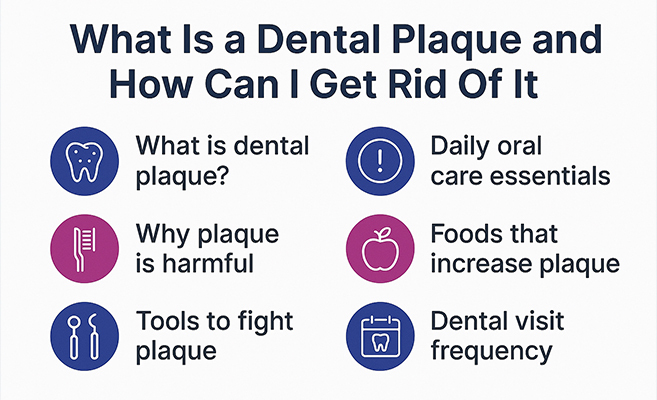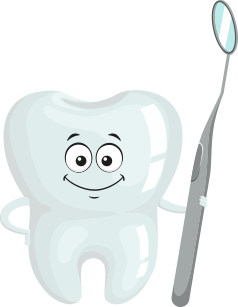What Is a Dental Plaque and How Can I Get Rid Of It

That sticky, fuzzy film on your teeth after skipping a brush? That’s dental plaque—and it’s more than just a nuisance. What is a dental plaque, exactly? It’s a colorless, soft layer of bacteria that constantly forms on your teeth and gums. While invisible at first, if left unchecked, it can lead to tartar, cavities, gum disease, and even tooth loss.
The good news? It’s entirely preventable and manageable with the right care and expert guidance.
This comprehensive guide will help you understand the real impact of plaque, why it forms, and how to get rid of dental plaque effectively.
Understanding Dental Plaque: What Is It Really?
Dental plaque is a soft, sticky film filled with bacteria that develops on your teeth and gum line. It forms when food particles mix with saliva and bacteria, creating an acidic environment that attacks tooth enamel.
What Is Dental Plaque Made Of?
- Bacteria (mostly Streptococcus mutans)
- Food debris
- Saliva proteins
- Sugars and carbohydrates
Where Does Dental Plaque Come From?
- Along the gumline
- Between teeth
- On the chewing surfaces of molars
- Around dental restorations (fillings, crowns)

Left untreated, plaque hardens into tartar (calculus), which cannot be removed by brushing alone.
Why Should You Be Concerned About Plaques?
Here’s what happens when dental plaque builds up:
- Tooth Decay – Plaque bacteria release acids that erode enamel, leading to cavities.
- Gum Disease (Gingivitis & Periodontitis) – Plaque along the gumline irritates soft tissue, leading to inflammation, bleeding, and gum recession.
- Tartar Formation – After just 48 hours, plaque can mineralize into tartar, which must be removed by a dentist.
- Bad Breath – Bacterial buildup creates foul odors and chronic bad breath.
- Systemic Health Issues – Research links plaque-related gum disease to heart conditions, diabetes, and respiratory problems.
How to Get Rid of Dental Plaque: 7 Expert-Recommended Tips
Getting rid of plaque isn’t just about brushing harder. It requires smart, consistent habits and occasionally, professional help.
1. Brush Your Teeth Twice a Day (Properly):
- Use a soft-bristled toothbrush
- Brush for at least two minutes
- Angle your brush at 45 degrees to the gumline
2. Use Fluoride Toothpaste:
Fluoride helps remineralize enamel and reduce bacteria.
3. Floss Daily:
Plaque hides between teeth where your brush can’t reach. Flossing dislodges it before it hardens.
4. Use an Antibacterial Mouthwash:
Chlorhexidine or essential oil-based rinses help kill residual bacteria.
5. Stay Hydrated:
Dry mouth increases plaque. Drink plenty of water to keep saliva flowing.
6. Avoid Sugary and Starchy Foods:
These feed the bacteria that produce acid and increase plaque formation.
7. Chew Sugar-Free Gum:
It stimulates saliva production, which naturally neutralizes plaque acids.
When Home Care for Dental Plaque Isn’t Enough: The Role of Professional Dental Cleaning
With perfect brushing (even twice), plaque can calcify into tartar, which only a dental professional can remove.
Benefits of Professional Cleaning:
- Complete tartar removal
- Early detection of dental issues
- Polishing teeth for smoother, plaque-resistant surfaces
- Personalized oral hygiene tips
Scheduling professional dental cleanings every six months at a trusted dental hospital in Chennai is key to long-term plaque control.
Myths About Dental Plaque You Should Stop Believing
Myth 1: Plaque is only a problem if you eat sweets.
Fact: Even healthy foods like fruits and bread contain sugars and starches that feed plaque-forming bacteria.
Myth 2: If you can’t see it, it isn’t there.
Fact: Plaque is often invisible until stained by plaque disclosing agents or felt as a fuzzy layer on your teeth.
Myth 3: Hard brushing removes plaque better.
Fact: Overbrushing can damage gums and enamel. Technique is more important than pressure.
Kids and Plaque: Why Early Habits Matter
Plaque control starts early. Children are especially vulnerable to plaque buildup due to poor brushing habits, high sugar intake, and growing teeth.
Tips for Parents:
- Supervise brushing until age 7-8
- Introduce flossing as soon as two teeth touch
- Schedule pediatric dental visits twice a year
- Choose fluoride-rich toothpaste for kids (age-appropriate)
Tools That Help Fight Plaque
Must-Have Oral Hygiene Tools:
- Electric toothbrush (with pressure sensors and timers)
- Water flossers (great for braces or implants)
- Tongue scrapers
- Plaque-disclosing tablets (to highlight missed spots)
What If You Ignore Dental Plaques?
Neglecting plaque doesn’t just mean cavities.
Long-Term Consequences:
- Periodontal disease
- Bone and tooth loss
- Tooth abscesses
- Expensive and complex dental treatments
Early intervention is always less invasive and more cost-effective.
Preventive Professional Dental Care: Your Best Defense Against Plaque
A combination of smart home care and regular visits to a trusted dentist offers the best protection against plaque-related issues. Whether you’re due for a routine cleaning or experiencing symptoms of gum disease, getting professional help makes all the difference.
If you’re searching for the best dentist in Chennai, a visit to Radiant Dental Care offers a holistic, patient-centric approach to oral health. From plaque control to complete smile makeovers, our expert dentists focus on long-term prevention, not just temporary fixes.
Take Control of Your Oral Health Now!
Plaque may be common, but it’s not harmless. It’s the root of many dental problems—but the good news is, it can be controlled with awareness, consistency, and expert care.
Understanding what a dental plaque is and learning how to get rid of dental plaque empowers you to make better choices for yourself and your family.
With guidance from experienced dental professionals, including those at Radiant Dental Care, you can take proactive steps to maintain a plaque-free smile that lasts a lifetime.
Book an appointment with our expert dentists, from any of our 9 clinics in Chennai.
Frequently Asked Questions:
- Can certain foods increase plaque formation?
Ans. Yes, sugary and starchy foods like candies, soft drinks, white bread, and chips fuel plaque-causing bacteria. Eating these frequently without proper oral hygiene can accelerate plaque buildup.
- How do I know if I have plaque or tartar?
Ans. Plaque is usually invisible but may feel like a fuzzy coating on your teeth. Tartar, on the other hand, appears as yellow or brown hardened deposits, especially near the gum line, and needs professional cleaning for removal.
- Is it possible to reverse early plaque damage?
Ans. Yes, if caught early, the effects of plaque—like mild gum irritation—can be reversed with improved brushing, flossing, and regular dental visits. However, untreated plaque can lead to irreversible gum disease.
- Are electric toothbrushes better at removing plaque?
Ans. Studies suggest that electric toothbrushes, especially oscillating-rotating ones, are more effective at reducing plaque and gingivitis compared to manual brushes. However, proper technique matters most.
- Does smoking affect plaque buildup?
Ans. Absolutely. Smoking not only increases plaque formation but also affects gum health, reduces blood flow, and masks early signs of gum disease—leading to faster progression of oral issues.
- How early should kids start plaque prevention?
Ans. Plaque prevention should begin as soon as the first tooth appears. Use a soft baby toothbrush with a smear of fluoride toothpaste and gradually teach children proper brushing habits as they grow.

 +91 9513446186
+91 9513446186
